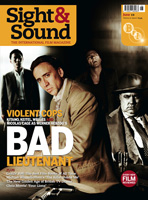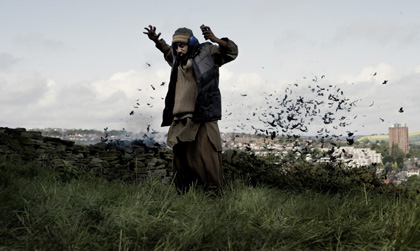Primary navigation


Bomb-making pratfalls and meathead jihadis abound as controversy-courting satirist Chris Morris tackles Islamic fundamentalism in his debut feature ‘Four Lions’, but tragedy lurks beneath the farce, says Ben Walters
“I feel more suggestible already,” the comedian Richard Blackwood said in the Brass Eye special, having sniffed a computer keyboard that supposedly emitted fumes designed to increase children’s vulnerability to online paedophiles. Given his position as one of the numerous public figures gulled by the spoof current-affairs programme’s creator, Chris Morris, into supplying on-camera support for preposterously fictitious pressure campaigns, Blackwood’s words were deliciously if unintentionally on point. They also flagged up an ongoing concern of Morris’ – a disdain for suggestibility, one of the hallmarks of his long, diverse and often controversial satirical career.
The news-bulletin pastiches On the Hour (Radio 4, 1991) and The Day Today (BBC2, 1994) demonstrated the ease with which the stentorian rhetoric of broadcast journalism could be applied to palpably absurd subject matter with such acuity that it was harder afterwards to take any news package at face value. Through stings such as that targeting Blackwood, Brass Eye (Channel 4, 1997 and 2001) expanded that scepticism to great swathes of public utterances by politicians and celebrities on any given issue, skewering both their subject’s – and, by extension, audiences’ – credulity. The sketch comedy of Blue Jam (Radio 1, 1997) and Jam (Channel 4, 2000) mined queasy humour from authority figures taking perversely blasé attitudes towards matters of life and death, to the largely acquiescent bewilderment of other people – a mode developed in Morris’ Bafta-winning short, My Wrongs 8245-8249 and 117 (2002), in which a man is urged into grotesque transgressions by a condescending, well-spoken dog. The media-land sitcom Nathan Barley (2005) despaired at the ease with which ridiculous, base or immoral behaviour could be rendered fashionable through the fear of appearing uncool by rejecting it. And now Morris’ feature film debut, Four Lions, presents homegrown jihad as less a violently single-minded philosophy than a function of woolly thinking, impressionable insecurity and good old-fashioned peer pressure. This is suggestibility at its most tragically consequential.
Not much comedy has been made about Islamist terrorism. The relatively little humorous film-making that has engaged with the ‘war on terror’ has tended to focus on the absurdities of the western stance: think of the bombastic-bathetic marionettes of Team America: World Police (2004) or the servile political manoeuvring of In the Loop (2009), whose director, Armando Iannucci, worked with Morris on On the Hour and The Day Today, and one of whose writers, Jesse Armstrong, collaborated (along with his writing partner Sam Bain and Morris himself) on the script for this film. Violent Islamic extremists appear as pantomime villains in Team America and not at all in In the Loop. Morris, characteristically engaging the taboo head-on, focuses entirely on jihadis and presents them as buffoons.
Set in a northern English town, Four Lions is the result of several years of intense research that have, it seems, persuaded Morris that jihad is predominantly the domain of the dim. Rather than choosing to anatomise his characters’ disillusionment contemporary British society, his story takes it as a given. Their idiocy is also clear from the off. Waj (Kayvan Novak) is a meathead who mistakes chickens for “fucked-up rabbits with no ears”. Faisal (Adeel Akhtar) thinks that holding his hands in front of his beard constitutes convincingly disguising himself as a woman. Barry (Nigel Lindsay), a touchy white convert to Islam, punches himself in the face as a way of testing by physical analogy his hypothesis that bombing a mosque would be a shrewd move. Hassan (Arsher Ali), the youngest and cockiest of the group, invites a neighbour in for a dance while bomb-making equipment lies strewn across the living room. Only Omar (Riz Ahmed), the cell’s leader, displays normal levels of competence and intelligence; yet he is responsible for a catastrophic blunder during his and Waj’s trip to a Pakistani training camp and, it is implied at the end, after he has orchestrated the cell’s fatal attack on the London Marathon, he realises that on a fundamental level he has been a fool.
The group’s incompetence is the source of a lot of very funny verbal, physical and conceptual jokes. Morris’ work is usually characterised by a hyper-detailed mise en scène and highly stylised, semi-nonsensical verbiage, but here the humour is relatively straightforward, with laughs coming from absurdly misplaced anger at society (“It’s the parts!” Barry insists when his car breaks down, “They’re Jewish!”), inane metaphysics (as when Waj’s mission is distilled into the phrase “rubber-dinghy rapids”, connoting the equivalence of salvific martyrdom to a queue-jump ticket at Alton Towers) and pratfalls (poor Faisal provides the ultimate extrapolation of the banana-skin gag). The gang also supplies a steady stream of bathetic references to the kind of banal, bourgeois, consumerist pop culture they ostensibly abhor, from Mortal Kombat and The Lion King to Nectar cards and the Honey Monster. Neither the processed cheese snack Mini Babybels nor the infuriatingly catchy pop single ‘Dancing in the Moonlight’ will seem the same again, and it’s hard to take entirely seriously radical guerrillas who communicate via cartoon avatars on a website called PuffinParty. (After a falling out, we hear that “Barry’s puffin turned all red and is hiding under the pirate hat.”)
The film’s sustained attention to communication strategies, puffin-related or otherwise, is unsurprising given the emphasis Morris’ postmodern satirical sensibility has always placed on the power and self-importance of the media, rather than conventional political subjects. In fact, it’s not too big a stretch to say Four Lions engages with jihad as a branch of the media, quickly establishing tension between voluntary and involuntary image-making: propaganda and surveillance. There’s much business to do with martyrdom videos, seen here as vanity projects replete with what Omar calls “bloopers”; in the Pakistani mountains, Waj uses his phone to film himself firing automatic weaponry and calling himself “Paki Rambo”; and Hassan, who has recently failed his media studies exams, habitually videos the group’s experiments with explosives, from the sourcing of materials to the construction of bombs and their inadvertent detonation. On the surveillance side, Barry instructs the others to swallow their SIM cards to avoid tracking and shake their heads from side to side to frustrate photography by “space cameras” – although paranoid, he isn’t wrong to suspect they are being watched, as the film’s use of still, closed-circuit, aerial and night-vision footage illustrates. A closing sequence charting the aftermath of the group’s actions reiterates the importance of media strategy, with acquaintances, officials and conspiracy theorists among those jockeying for control of the narrative.
The subject matter of Four Lions makes inevitable a more explicit engagement with politics than in Morris’ past work and there is a smattering of In the Loop-style gags about political expedience – “It must be the target,” a police sniper declares, “I just shot it.” The film also extends the interest in sustained narrative and emotional engagement that has been a fairly recent development in his career, having come to the fore in My Wrongs… and Nathan Barley. The film could be seen as a tragedy in which Omar and Barry exploit Waj and Hassan’s suggestibility in the service of their fatalism. In Pakistan, Omar and Waj competitively insist on their willingness to kill one another while, in scenes that recall the uncanny, unsettling territory of Jam, Omar’s family buoy his spirits when he loses heart: “You were much more fun when you were going to blow yourself up, love,” his wife Sofia (Preeya Kalidas) says with coquettish sincerity, while their young son chirpily reassures him that a fellow jihadi will “be in heaven before his head hits the ceiling”. The film’s rendering of fundamentalism as essentially sympathetic – in the way that, say, Norman Bates or Tom Ripley are sympathetic – is its peculiar achievement. Towards the film’s end, wordlessly expressive close-ups suggest action borne out of peer pressure, confusion, bloodlust and pride, leaving their consequences all the sadder and more pathetic. The murderous schemes of laughably fallible humans, the film suggests, are no less tragic for being absurd.
Chris Morris talks terrorism, ideology and idiocy on page 59 of the June 2010 issue of ‘Sight & Sound’
Asses’ den: Kate Taylor reports on the Bradford premiere of Four Lions (April 2010)
The Hurt Locker reviewed by Guy Westwell (September 2009)
Bomb culture: B. Ruby Rich on Hany Abu-Assad’s Paradise Now (April 2006)
Paradise Now reviewed by Ali Jafaar (May 2006)
Team America: World Police reviewed by Leslie Felperin (January 2005)
11’09”01 September 11 reviewed by Peter Matthews (January 2003)
The Siege reviewed by Ken Hollings (February 1999)